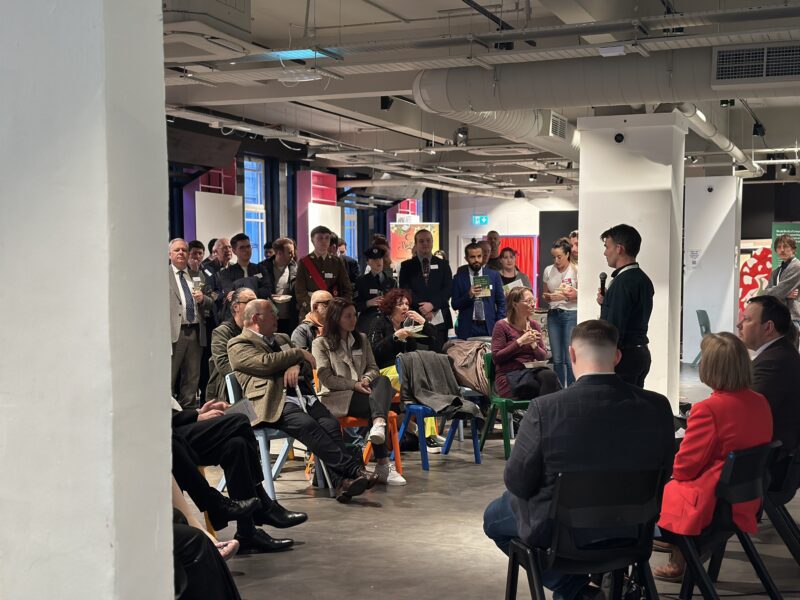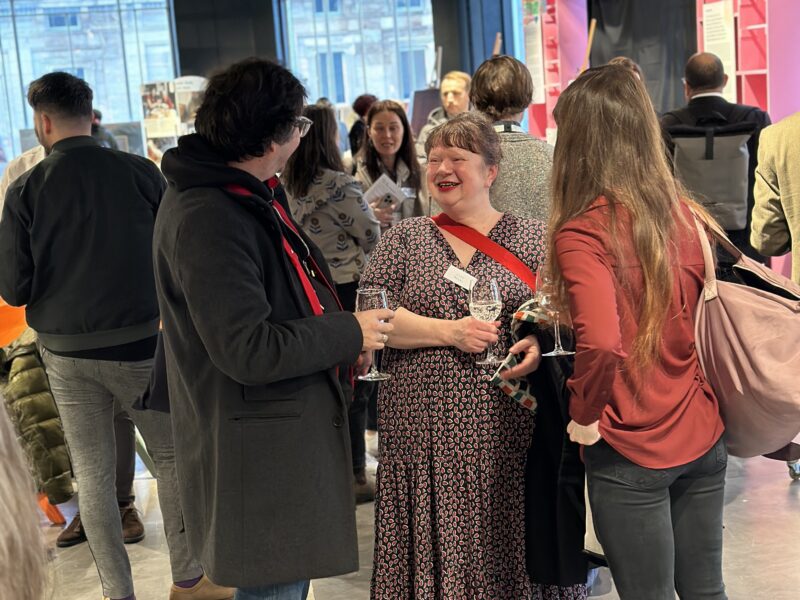Liverpool’s Good Food Plan addresses key issues related to the food we eat in Liverpool.
This includes food insecurity, access to and take-up of healthy, nutritious food, the impact the food we eat is having on our planet, and the practices by which the food we eat is produced. The Plan was developed by residents and organisations across Liverpool, before it was formally launched in October 2021.
Leaders from across the city gathered at LUSH on 29th February to celebrate the progress made during the second year of the Good Food Plan and commit to ‘Join the Good Food Movement’ to work towards the vision of a city where everyone can eat good food. They were treated to a viewing of the Good Food; Our Food photo exhibition, which celebrates the good food stories of cultural communities across Liverpool.
To mark the progress made, The Good Food Plan taskforce – co-chaired by Liverpool City Council Public Health and Feeding Liverpool – have published their second Impact Report sharing the progress made under each of the five goals of the Plan.
Highlights from Good Food Plan 2023 Impact Report include:
Goal 1: Good Food at Points of Crisis
- £4,865,000 of support via supermarket vouchers was given to families identified as at risk of food insecurity during the school holidays.
- 115 community providers provided 387,000 meals for over 14,000 children and young people through Liverpool’s Holiday Activity and Food Programme and Eat to Meet half term playscheme provision.
- Over 7,723 emergency foodbank parcels were boosted with fresh produce through the Winter Boost Project.
- 61 people trained as Community Healthy Start Champions. Overall uptake of the Healthy Start in Liverpool increased from 65% in January to 76% in December.
- The Queen of Greens mobile greengrocer was visited over 13,720 times this year.
- £1,056,000 of the Household Support Fund was given to 74 organisations, who provide food support across 109 sites including foodbanks, food pantries and community markets.
- 98% of food support organisations are now offering at least one form of ‘wrap around support’ for people who use their services. Over 40% of food support spaces co-locate money and debt advice, and/or welfare and benefits advice services at their food spaces.
Goal 2: Uncovering the true scale of food insecurity
- Food insecurity questions were included for the first time within Liverpool City Council’s Residents Survey.
Goal 3: Enabling food citizenship
- Good Food; Our Food, photo exhibition was launched to celebrate stories of what good food means to cultural communities across Liverpool. The exhibition has already toured seven venues.
- Over 60 organisations operate community pantries, growing spaces, community markets or community shops and 41 organisations host regular community meals.
- 30 community leaders were trained to deliver the Fed-Up cooking course.
- BiteBack 2030’s Liverpool Youth Board launched a powerful campaign highlighting how junk food advertisers target young people.
- 31 young people engaged with food citizenship workshops.
Goal 4: Shifting policy and practice
- Local people played keys roles in national campaigns for Free School Meals for All and the Right to Food.
- Save Kids from Sugar campaign updated and school resources launched to support healthy eating.
- Healthy Weight Grant Programme awarded over £500,000 to voluntary sector organisations to support healthy weight and wellbeing.
- 74 food support organisations committed to follow the Good Food Procurement Principles.
Goal 5: Connecting the Community
- Liverpool Food Growers Network hosted 23 events enabling volunteers from the growing projects to meet each other and tour their sites.
- 160 people attended six Good Food events, sharing their expertise with each other through presentations, round table discussions and informal networking sessions.
- A new Good Food Plan working group: The Way Ahead working group, was established to explore the long-term sustainability of emergency and community food support.
Professor Matthew Ashton, Liverpool City Council Director of Public Health:
“Each of us has a role to play to build a city where everyone can eat good food and this report demonstrates the progress the partnership has made towards achieving the Good Food Plan’s goals.”
Dr Naomi Maynard, Good Food Programme Director, Feeding Liverpool:
“Whilst the challenges we face are significant, the progress made over the last few years has highlighted what can be achieved when we take a joined up, holistic approach to sustainable and healthy food.”
With over 300 organisations connected to and working towards the aims of Liverpool’s Good Food Plan, this Impact Report cannot share all that has happened in 2023 but, we hope, offers a glimpse into the work across the city. It has been compiled by the Good Food Taskforce with support from Feeding Liverpool.
We would like to extend our thanks to the residents and organisations working towards creating a city where everyone can eat good food.
Read the Good Food Plan 2023 impact report here.
Learn more about Liverpool’s Good Food Plan here.
For further information, get in touch with Good Food Taskforce co-chairs Melisa Campbell and Dr Naomi Maynard.



